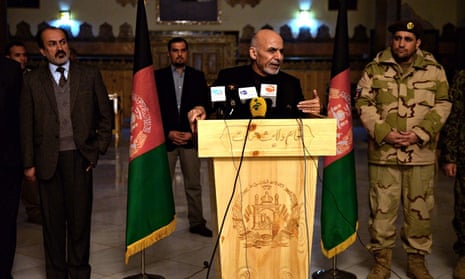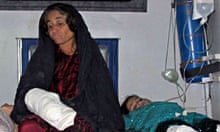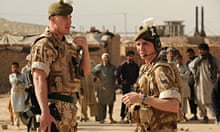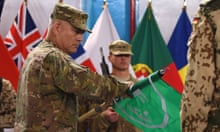After 13 years of war, Nato formally ended its combat operations in Afghanistan on Sunday, leaving the Afghan army and police in charge of security in a country plagued by continued fighting, a ferocious insurgency and a rising tide of both military and civilian casualties.
Against a backdrop of violent clashes in a number of provinces and several weeks of deadly attacks on the capital, military leaders lowered the flag of a mission conceived in 2001, and hoisted the colours of a new one under which Nato’s role will largely be restricted to training, advising and assisting the local army and police.
“Our Afghan partners can and will take the fight from here,” said General John F Campbell, the commander of the International Security Assistance Force (ISAF) at a ceremony in the capital.
As insurgent attacks have increased in many parts of the country in 2014, Afghan forces have already been leading the fight in recent months – but at a high price.
More than 5,000 local security forces have been killed this year alone, the highest toll since the war began. In comparison, the international coalition has suffered a total of 3,485 deaths since 2001.
“The Afghan national security forces had to suffer losses this year that are too high,” ISAF’s deputy commander Lieutenant General Carsten Jacobson said, speaking to reporters after the ceremony. “Now that [the Afghan forces] have taken over the tactical fight, losses lie on them.”
Between 17,000 and 18,000 international troops will remain in Afghanistan after 2014, of which 12,000 - including approximately 470 British troops - will form part of the new Nato mission, named Resolute Support.
An additional 5,500 US soldiers will perform different roles, including counterterrorism and logistical assistance. At their peak in 2011, international forces numbered close to 150,000.
The international coalition’s biggest achievement has been to help build a 350,000-strong security force in Afghanistan from scratch. But they are still ill-equipped, particularly when it comes to air support and intelligence gathering.
In the future, US troops will continue to provide air support in what they call “extreme situations.” In the past year, Afghan troops have asked for aerial assistance approximately 400 times, but received it in 30 cases.
Sunday’s ceremony took place at the headquarters of ISAF, which has increasingly turned into a fortress as the security situation in Kabul has deteriorated. In the wake of the recent elections and uncertainty over the military transition, insurgents have unleashed a wave of attacks on the capital.
2014 was not only the bloodiest year of the war for Afghanistan’s security personnel, but also for its civilians. According to a recent UN report, close to 10,000 civilians have been killed or wounded.
“There is a lot of concern for the rise in civilian casualties,” said Hadi Marifat, a Kabul-based analyst with the Centre for Civilians in Conflict. “The more territory the Taliban tries to occupy in the coming years, the more civilian casualties there will be because of military confrontations.”
But, despite the ever-intensifying war, optimism prevailed at ISAF headquarters.
“We now enjoy considerable momentum, as we enter 2015,” said Campbell, citing higher life expectancy, education and more women in the workforce as tangible evidence of Nato’s contribution. “There is no turning back to the dark days of the past.”
Another challenge facing the Afghan security forces is gaining trust of the people. The Afghan forces have long been criticised for heavy-handed methods against civilians. And with Nato withdrawing from the battlefield, there will be less monitoring of their methods, and of civilian casualties, said Marifat.Foreign troops have gradually learned how to limit civilian casualties over the past 13 years, said Marifat.
“The key issue for ISAF now is to transfer those lessons learned to the Afghan national security forces, so they don’t repeat them,” he said.
The signing in September of two security pacts between the Afghan government, Nato and the US brought renewed optimism to the country. But since the formation of the national unity government at around the same time, all political decisions in Afghanistan have been put on hold due to the government’s inability to form a cabinet.
Afghan national security advisor Hanif Atmar, who signed the security agreements, also spoke at the ceremony on Sunday, expressing gratitude to the international forces for their sacrifices.
“The Afghan people pray for your fallen, wounded and their loved ones,” Atmar said to the international delegates. “We will never forget your sons and daughters who have died on our soil. They are now our sons and daughters.”
Lending a phrase from president Ashraf Ghani, Atmar said: “Afghanistan is now awakening from a 40-year-old nightmare.” However, he also offered sobering words as a reminder that although Nato is seeking to end combat, the war is not over.
“The threat to our shared national security interests and our shared civilisation is morphing. New non-state actors have emerged in the region in the past couple of years to pursue a deadly campaign against innocent people and the state system,” Atmar said.
“We do not want or expect that you will support us indefinitely. However, we need your partnership and support now more than ever.”




